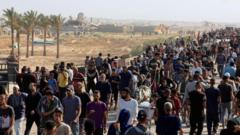The Israeli military's acknowledgment of a "technical error" intensifies the calls for accountability amidst escalating violence in Gaza.
**Tragic Loss in Gaza: Family Reflects on Son Killed in Water Point Strike**

**Tragic Loss in Gaza: Family Reflects on Son Killed in Water Point Strike**
A father's heart-wrenching plea for peace after losing his son in a deadly Israeli airstrike highlights the ongoing humanitarian crisis.
Mahmoud Abdul Rahman Ahmed's grief echoes through the streets of Nuseirat refugee camp as he recounts the day his son, Abdullah, was killed. On a search for water, Abdullah joined other children at a distribution point, only to fall victim to an Israeli airstrike that claimed ten lives, including six children. The attack not only underscores the dire humanitarian crisis in Gaza, exacerbated by ongoing hostilities and blockades, but also ignites outrage and calls for international intervention.
Mahmoud described the dire conditions in Nuseirat, where families affected by conflict seek basic necessities like water. "The children, Abdullah among them, stood in a queue with empty stomachs and thirsty lips," he recounted. Tragically, mere moments after the gathering began, the airstrike occurred, demolishing hope along with lives.
Witnesses documented the chaos following the strike, showcasing a scene filled with destruction and despair. Eyewitness accounts confirmed the death and injury of countless individuals who were there solely to obtain water. The Al-Awda hospital reported that six children were among those killed, with families now left to grieve lost futures.
In a response laden with regret, the Israeli military claimed the strike aimed at a terrorist target went awry due to a "technical error." They expressed sorrow over the civilian casualties but also stressed accountability lies with Palestinian militant actions. This defense drew criticism from community leaders like Mahmoud and representatives from the United Nations, who argue that the ongoing violence disproportionately impacts the innocent.
The UN reported worsening water shortages across Gaza, with severe implications for civilian life amid the conflict. Sam Rose from Unrwa highlighted how children routinely wait on the streets for water, with many receiving far less than the emergency standard daily. Mahmoud underscored the tragedy of children who yearn for a normal childhood, filled with simple joys, now dashed by violence.
Catherine Russell of Unicef condemned the actions resulting in the deaths of these children as "horrific," urging Israeli authorities to review military engagement rules in light of humanitarian law obligations. Meanwhile, the UN Security Council is set to convene to discuss the ongoing situation in Gaza, highlighting the urgent need for resolution in a conflict causing unrelenting suffering.
As Mahmoud spoke of his lost son, his call was clear: an end to the war is imperative. With no recourse to arms or power against the state apparatus of conflict, he echoed sentiments shared by many civilians caught in the crossfire, calling for global pressure to halt the violence. "We are victims just like anyone else," he declared, capturing a sobering reality amidst a grim humanitarian crisis.
Mahmoud described the dire conditions in Nuseirat, where families affected by conflict seek basic necessities like water. "The children, Abdullah among them, stood in a queue with empty stomachs and thirsty lips," he recounted. Tragically, mere moments after the gathering began, the airstrike occurred, demolishing hope along with lives.
Witnesses documented the chaos following the strike, showcasing a scene filled with destruction and despair. Eyewitness accounts confirmed the death and injury of countless individuals who were there solely to obtain water. The Al-Awda hospital reported that six children were among those killed, with families now left to grieve lost futures.
In a response laden with regret, the Israeli military claimed the strike aimed at a terrorist target went awry due to a "technical error." They expressed sorrow over the civilian casualties but also stressed accountability lies with Palestinian militant actions. This defense drew criticism from community leaders like Mahmoud and representatives from the United Nations, who argue that the ongoing violence disproportionately impacts the innocent.
The UN reported worsening water shortages across Gaza, with severe implications for civilian life amid the conflict. Sam Rose from Unrwa highlighted how children routinely wait on the streets for water, with many receiving far less than the emergency standard daily. Mahmoud underscored the tragedy of children who yearn for a normal childhood, filled with simple joys, now dashed by violence.
Catherine Russell of Unicef condemned the actions resulting in the deaths of these children as "horrific," urging Israeli authorities to review military engagement rules in light of humanitarian law obligations. Meanwhile, the UN Security Council is set to convene to discuss the ongoing situation in Gaza, highlighting the urgent need for resolution in a conflict causing unrelenting suffering.
As Mahmoud spoke of his lost son, his call was clear: an end to the war is imperative. With no recourse to arms or power against the state apparatus of conflict, he echoed sentiments shared by many civilians caught in the crossfire, calling for global pressure to halt the violence. "We are victims just like anyone else," he declared, capturing a sobering reality amidst a grim humanitarian crisis.


















